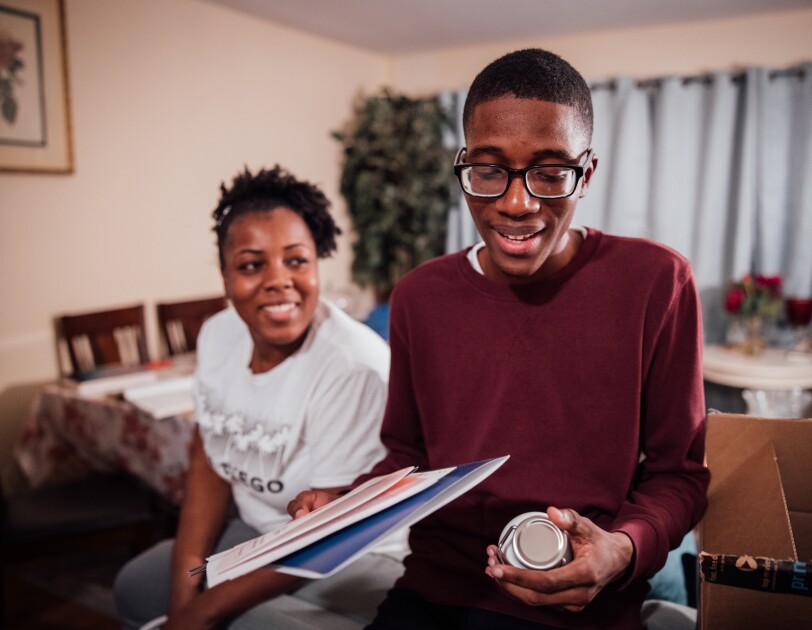A West Virginia teen from a coal-mining family says getting through school has often been a challenge. A Korean American had a difficult home life and struggled with English, but showed promise with math. And despite growing up in a neighborhood plagued by violence, a New Jersey teen has an advanced understanding of computers. These students are three of the 100 winners of the first Amazon Future Engineer scholarships that will help them pay for college, and get a little closer to achieving their dreams.

Leo Jean Baptiste’s mother says the Amazon Future Engineer scholarship is a huge weight off her shoulders.

Leo and his mother, learning that the 17 year old has been awarded the Amazon Future Engineer scholarship.

The Amazon Future Engineer program gives students from underrepresented and underserved communities across the country access to computer science camps and classes in addition to scholarships and internships at Amazon.
“This scholarship means that when I go to college, I won’t have to constantly worry about money,” said seventeen-year-old Leo Jean Baptiste, an Amazon Future Engineer scholarship winner from Orange, New Jersey.
Leo is the son of a hard-working single mom. He grew up speaking Haitian Creole in a home without internet access, surrounded by a community rife with drugs and gang activity. He’s risen to the top of his high school class, but was uncertain if he’d have the resources to pay for college. In addition to a heavy school load, Leo is an ROTC leader, an elementary school tutor, and a volunteer in an after-school program that tries to rid his community of drugs and alcohol. He says he wants to work in machine learning when he gets older.
“Leo has to put in time and a half, if not double, what others have to put in across the country to get the same things,” said Hooman Behzadpour, Leo’s math teacher at Orange High School. “Leo never complains. He has high obstacles to overcome, and he overcomes them all silently and diligently.” Behzadpour called Leo “the brightest student I’ve ever had.”
When Leo applied for the Amazon Future Engineer scholarship, he was nervous. News of the award has come as a huge relief. His mother said it’s taken a huge load off her shoulders, since the top colleges he has gotten into are very expensive.
“He’s going to be a brilliant computer scientist and more than that, based on the conversations I’ve had with him, he wants to use that computer science to really make a change and better the world,” said Behzadpour.
As part of the Amazon Future Engineer scholarship, students receive $10,000 a year for four years while pursuing a computer science degree in college. They are also guaranteed a paid internship offer at Amazon’s Seattle headquarters, including a housing stipend.
Amazon Future Engineer is a four-part, childhood-to-career program intended to empower, educate, and train 10 million students from underrepresented and underserved communities each year to pursue careers in computer science.
According to the Bureau of Labor Statistics, the average computer science major makes 40% more in lifetime earnings than the average college graduate and nearly three times more than the average high school graduate. Despite the opportunity, the vast majority of public elementary and high schools, particularly those in underprivileged or under-represented communities, do not offer computer science classes.
“Getting to the point where I am has definitely been hard. There’s been times where I felt like giving up,” said Leo.

But the high school senior, who calls himself “passionately curious” believes he is now on his way to a career in technology. He’s already thinking about his next steps, and helping others at the same time.
“I want to become an artificial intelligence or machine learning researcher,” he said. “Even further into the future, I’d like to start a non-profit that’s able to help other kids who are struggling financially.”







